Gertrude Bell
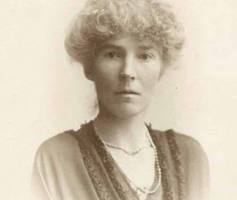

GERTRUDE BELL
"Daughter of the Desert: The Woman Who Made Kings"
🎥 Watch the Introduction:https://youtu.be/x0q2Th2Mq3A
WELCOME TO GERTRUDE'S WORLD
Step into the extraordinary life of a woman who defied every convention of her time. From the grand halls of a Victorian mansion to the shifting sands of the Arabian desert, from the dreaming spires of Oxford to the corridors of power in Baghdad, Gertrude Bell's story is one of courage, intellect, and an unquenchable thirst for adventure.
This is more than a biography—it's an immersive experience that brings history to life through cutting-edge QR technology, allowing you to explore the world through Gertrude's eyes and understand how one remarkable woman helped shape the modern Middle East.
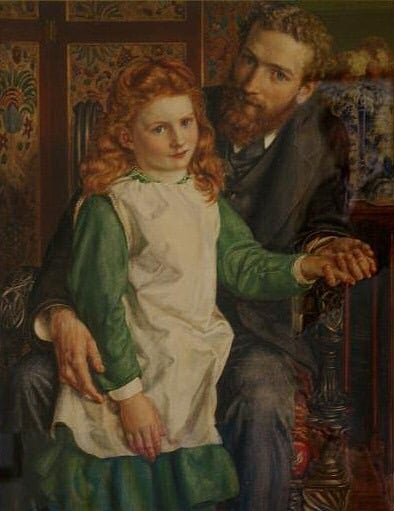

"Born to Break Boundaries" (1868-1892)
In the grand halls of Washington New Hall, County Durham, on 14th July 1868, a child was born who would grow up to redraw the maps of nations. But Gertrude Bell's story begins not with destiny, but with a profound loss...
Early Life: Foundation of Greatness
Gertrude Bell was born on 14 July 1868 in Washington New Hall—now known as Dame Margaret Hall—in Washington, County Durham, England. Her family's wealth would prove crucial, enabling both her exceptional education and her groundbreaking travels that would change the course of history.
The Bell Dynasty:
Grandfather: Sir Isaac Lowthian Bell, iron master, industrialist, and Liberal Member of Parliament (1875-1880)
Father: Sir Hugh Bell, 2nd Baronet, progressive capitalist and mill owner who ensured fair wages for workers
Mother: Mary (née Shield) Bell, daughter of John Shield of Newcastle-on-Tyne
The Defining Tragedy: Mary Bell died in 1871 while giving birth to Maurice Bell (later the 3rd Baronet). Gertrude was just three years old. This profound loss led to an extraordinarily close relationship with her father that would shape her entire worldview.
"My father was my greatest teacher, my dearest friend, and my constant correspondent. He taught me that a woman's mind was not a decoration to be admired, but a tool to change the world."
— Gertrude Bell
Sir Hugh Bell shared his knowledge of government and provided access to highly placed officials, giving Gertrude insights into power and politics that few women of her era possessed.
The Transformative Stepmother
When Gertrude was seven, her father remarried Florence Bell (née Olliffe), bringing not just maternal love but intellectual curiosity to the household. Florence Bell was:
A playwright and author of children's stories
Author of a study on Bell factory workers
An advocate for education and women's development
Influential in Gertrude's later promotion of education for Iraqi women
Florence instilled concepts of duty and decorum while recognising Gertrude's exceptional intelligence. The Bell household became a place where ideas flourished and conventional limitations were questioned.
Academic Excellence: Breaking Barriers
Queen's College, London (1883-1886):Gertrude attended this prestigious school for girls, receiving an education that few women of her time could access.
Oxford University - Lady Margaret Hall (Age 17): History was one of the few subjects women were permitted to study due to the restrictions of the era. Gertrude specialised in modern history and achieved something unprecedented:
🏆 HISTORIC ACHIEVEMENT:
First woman to graduate in Modern History at Oxford with first-class honours
Completed her studies in just two years (typically took three)
One of only 11 graduates that year (9 men recorded, 2 women ignored)
Contemporary Press Coverage:
"Miss Gertrude Bell has achieved the unprecedented feat of earning first-class honours in Modern History—the first woman ever to do so. She completed her studies in just two years, a remarkable achievement that has astonished her professors and fellow students alike."
Gertrude's Response:
"They said women couldn't think like men. I proved them right—we think better."
The Bitter Irony: Oxford wouldn't actually award her the degree until 1920—thirty-two years later—when the university finally acknowledged what everyone already knew: Gertrude Bell was extraordinary.
Personal Life: The Path Not Taken
Gertrude never married or had children, a choice that would define her unconventional life:
The London Season (1890-1892): After Oxford, she spent two and a half years in London's social rounds of balls and banquets where eligible young people paired off. She failed to find a suitable match.
The Persian Romance (1892): In Persia, she courted Henry Cadogan, a mid-ranking British diplomat in Tehran. Her father refused permission when he discovered Cadogan was deeply in debt and not her social equal. Cadogan died in 1893; Bell received the devastating news via telegram.
Later Relationships:
Sir Frank Swettenham: British colonial administrator met in Singapore (1903), maintained correspondence until 1909, brief passionate affair after his retirement (1904)
Major Charles Doughty-Wylie: Married man with whom she exchanged love letters (1913-1915). His death at Gallipoli in April 1915 devastated Bell.
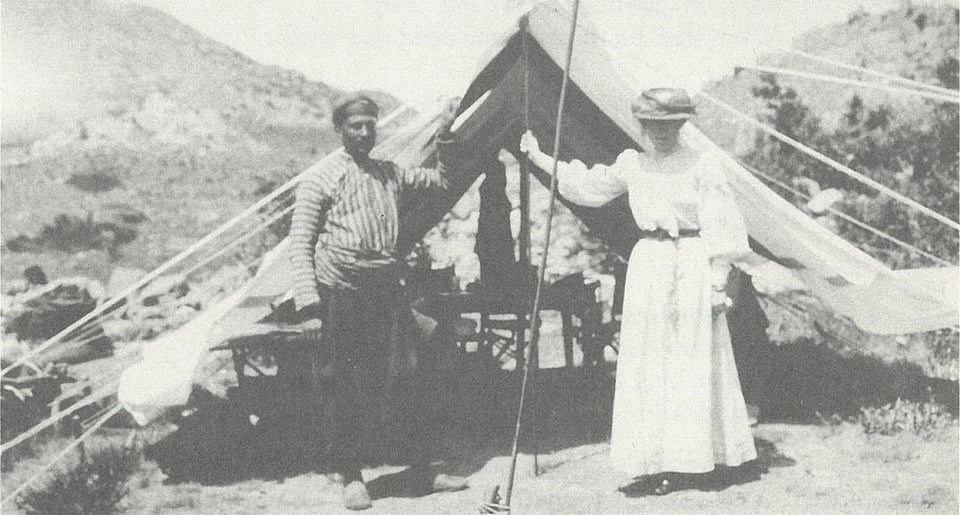

"Finding Her Element" (1892-1914)
The Persian Awakening: A Life-Changing Journey
In May 1892, at age 24, Gertrude traveled to Tehran to visit her uncle, Sir Frank Lascelles, the British minister to Persia. What was meant to be a conventional family visit became a life-changing awakening to the beauty and complexity of the East.
"Paradise," she called Persia in her first letter home. "I have never seen anything so beautiful, so ancient, so alive with poetry and possibility."
"The gardens of Isfahan are like something from a dream. Rose petals float on fountain waters, and the air is sweet with jasmine. But it's not just the beauty that captivates me—it's the sense of standing at the crossroads of civilisations, where East meets West, where ancient wisdom lives alongside modern ambition."
The Impact: Gertrude spent six months in Persia, learning the language, studying the culture, and falling in love with a world that most Victorian women would never see. Her book "Persian Pictures,"published in 1894, would introduce Western readers to the beauty and complexity of Persian civilisation.
The Mountain Climber: Conquering New Heights
Gertrude was never content with just one passion. Back in Europe, she discovered mountaineering and excelled with the same determination she brought to everything else.
Linguistic Mastery: She became fluent in six languages: Arabic, Persian (Farsi), French, German, Italian, and Turkish.
Literary Achievement (1897):Published a well-regarded translation from Persian into English of the poems of "The Divan Hafez"—later praised by Edward Denison Ross, E. Granville Browne, and other scholars.
Physical Preparation: Her horse riding skills, practiced from a young age, would prove invaluable in her desert travels.
Alpine Adventures: Dancing with Death
Middle East Exploration (1899-1900):
Visited historic Palestine and Syria
Journey from Jerusalem to Damascus
Became acquainted with the Druze living in Jabal Al-Druze
Mountaineering Achievements (1899-1904):
Climbed La Meije and Mont Blanc
Recorded 10 new paths or first ascents in the Bernese Alps, Switzerland
The Gertrudspitze(2,632m/8,635ft) in the Bernese Oberland was named after her following her first traverse with guides Ulrich and Heinrich Fuhrer in 1901
The Finsteraarhorn Attempt (August 1902): Her most dangerous climb nearly cost her life when inclement weather—snow, hail, and lightning—forced her and her guides to spend 48 hours clinging to the rock face.
"Forty-eight hours on the rope during our attempt on the Finsteraarhorn. Lightning, hail, and snow. We clung to the rock face with death a single slip away. My guides were terrified, but I have never felt more alive. In those moments of absolute peril, I discovered who I truly was."
She continued climbing in the Rocky Mountains during a North American trip (1903) but eased up on mountaineering in later years.
The Desert Calls: Finding Her True Element
By 1899, even the mountains of Europe could no longer contain her restless spirit. The Middle East beckoned with its ancient mysteries and untold stories.
"The desert and the sown, the wilderness and the inhabited land—how familiar it all is and how strange, how much expected and how much surprising."
Learning from the Masters: She traveled through Palestine and Syria, sleeping under desert stars, learning from Bedouin guides, and beginning to understand the complex tribal politics that would later make her invaluable to the British government.
"My guide Abu Tayi told me today: 'The desert teaches patience, courage, and truth. Those who listen to its lessons become wise. Those who ignore them perish.' I am learning to listen."
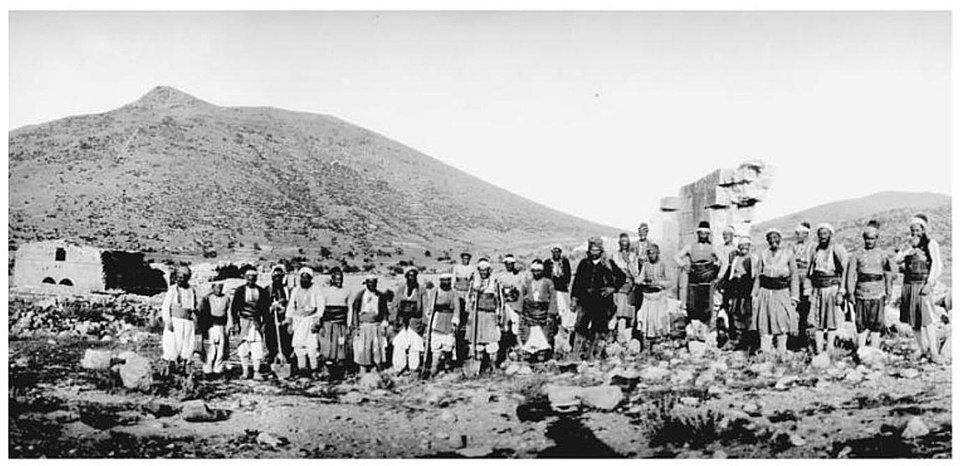

"Uncovering Ancient Worlds" (1905-1914)
The Scholar's Passion: Bridging Past and Present
Return to Syria (1905): Gertrude returned to the region, where she met Mark Sykes, then a British traveler. The two quarreled and shared a mutual dislike that would last until 1912, when they reconciled. She concluded her trip visiting archaeological sites in Asia Minor and Constantinople.
Literary Success: She published her observations in the 1907 book "Syria: The Desert and the Sown." The work vividly described, photographed, and detailed her trip to Greater Syria, including Damascus, Jerusalem, Beirut, Antioch, Alexandretta, and the lands of the Druze and Bedouin. The book received positive reviews and was a success in the Western world.
"Daughter of the Desert": A notable epithet came from her Syria trip, when a Bani Sakher tribesman paid her a compliment that became part of her public image: "Mashallah! Bint aarab"(As God wills it, a daughter of the Arabs), which she translated as being called a "daughter of the desert."
Archaeological Expeditions: Uncovering History
Binbirkilise Excavations (March 1907): Bell journeyed to Asia Minor (Anatolia) to work with Sir William M. Ramsay, an archaeologist and New Testament scholar. Together, they performed excavations of destroyed buildings and churches dating from the Byzantine era. Bell funded and planned these excavations, with results chronicled in the book "A Thousand and One Churches."
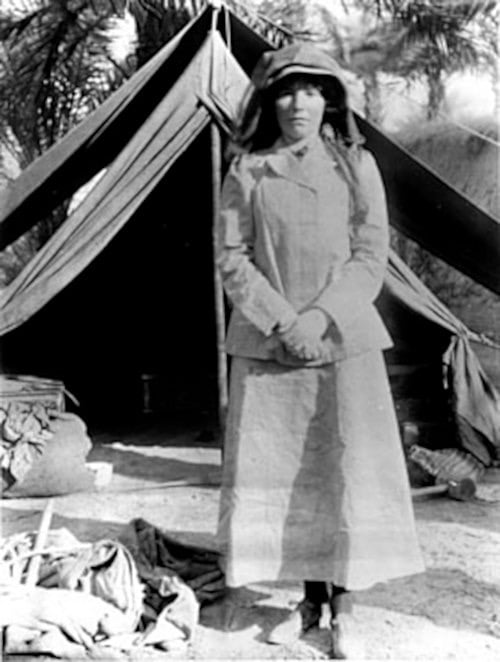

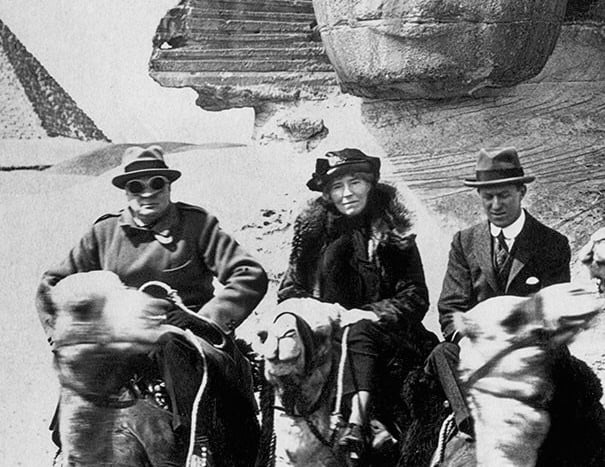

Their friendship would endure through war and political upheaval, two brilliant minds united by their love for the Arab world and their belief in its potential for greatness.
The Ha'il Adventure: Dancing with Danger
Her most dangerous journey came in 1913-1914: 1,800 miles from Damascus to the politically volatile Ha'il, deep in the Arabian Peninsula where few Westerners had ever ventured.
"I was only the second foreign woman ever to reach Ha'il. The Rashidi dynasty was crumbling, torn apart by assassination and tribal warfare. For eleven terrifying days, I was held prisoner, not knowing if I would live or die. 'In Ha'il,' I wrote afterward, 'murder is like the spilling of milk.'"
Learning in Captivity: Even in captivity, her curiosity never dimmed. She studied the political situation, mapped the city, and documented a world on the brink of transformation.
"Fear and fascination walked hand in hand during those eleven days. I was witnessing the death of an old order, the birth pangs of something new. The desert was teaching me lessons I would need in the years to come."
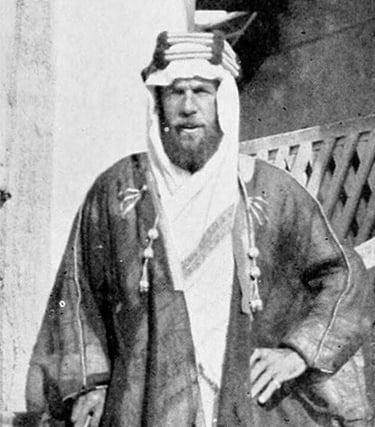

"When History Called" (1914-1921)
The Intelligence Officer: When Expertise Became Essential
When World War I erupted in August 1914, everything changed. The Ottoman Empire's entry into the war on Germany's side meant that Gertrude's beloved Middle East had become a battlefield.
The British government desperately needed someone who understood the complex tribal politics of the Arab world. There was only one person who combined scholarly knowledge with practical experience: Gertrude Bell.
Official Request:
"Miss Bell's assessment of the situation in Ottoman Syria, Mesopotamia, and Arabia is requested with utmost urgency. Her knowledge of local conditions and tribal allegiances is considered invaluable to His Majesty's Government."
War Service: From Red Cross to Intelligence
Red Cross Service (November 1914 - November 1915):
Served first in Boulogne, France, then London
Part of the Wounded & Missing Enquiry Department (W&MED)
Coordinated information between British Army, French hospitals, and worried families
Coincidentally met Judith Doughty-Wylie (wife of her lover) in Boulogne
The Arab Bureau: Planning Revolution
Cairo Assignment (November 1915): Bell was summoned to Cairo in the British protectorate of Egypt, arriving on 30 November. The Cairo detachment, headed by Colonel Gilbert Clayton and Lt. Commander David Hogarth, was called the Arab Bureau—a secret intelligence organization tasked with encouraging Arab revolt against Ottoman rule.
Reunion with Lawrence: Here she reunited with T.E. Lawrence, now working to coordinate the Arab Revolt. In cramped offices overlooking the Nile, they pored over maps and tribal genealogies, planning the liberation of peoples they had come to love.
Strategic Planning: The Bureau organized and processed data from Bell, Lawrence, and Captain W.H.I. Shakespeare about:
Location and disposition of Arab tribes
Regional mapping including water sources
Which tribes could be encouraged to join the British against the Ottoman Empire
Delhi Mediation: Bridging Differences
British India Assignment (February 1916):Bell's task in Delhi was to coordinate the Arab Bureau with the Government of India and mediate their differences. As she noted: "there was no kind of touch between us except rather bad tempered written telegrams!"
Lord Hardinge's Concerns: The Viceroy of India was skeptical of the Arab Bureau's promises of an independent Arab state, fearing that directly challenging the Ottoman Sultan's religious role as caliph could stir up unrest among India's substantial minority of Muslims. Bell's knowledge of the issues impressed Lord Hardinge, and she was soon sent on to Basra.
Basra: The Only Female Political Officer
Assignment to Basra (March 1916): Bell was sent to Basra (captured by the British in November 1914) to act as liaison between India and Cairo. At the time, the British were still recovering from recent setbacks in the Mesopotamian Campaign.
Joining Percy Cox's Staff: She joined Chief Political Officer Percy Cox as one of the few Westerners who knew the area. Cox found her an office in his headquarters, and she split her time between there and Military GHQ Basra.
Intelligence Work:
Traveled between Basra and Baghdad
Assessed stance and opinions of local inhabitants
Wrote reports and drew maps to aid British Army's advance on Baghdad
Initially unpaid, but Lord Chelmsford arranged formal paid position (June 1916)
Historic Appointment: She became the only female political officer in the British forces and received the title of Percy Cox's Oriental Secretary.
Professional Relationships: During her Basra work, she struck up close working relationships with fellow political officers Reader Bullard and the young St. John Philby.
Meeting Ibn Saud: Assessing Future Power
Basra Meeting (November-December 1916): Bell met Ibn Saud as Cox and India courted his support against the Ottoman-supporting Ibn Rashid. She was impressed and wrote an article in the Arab Bulletin extolling his abilities as a "politician, ruler, and raider."
Ibn Saud's Assessment: Ibn Saud was apparently less impressed with her. According to a later account by Philby, he mimicked her feminine and higher-pitched speech as an impression and joke to later Nejd audiences.
Prescient Warning (1920): Bell would later warn Lawrence that he was overestimating Sharif Hussein's position after war with Ibn Saud broke out, predicting that Ibn Saud was likely to defeat the Hejaz if the struggle continued.
The Oriental Secretary: Highest Rank for a Woman
Baghdad Assignment (11 March 1917):After British troops took Baghdad, Bell was summoned by Cox to the city. She was given the honour of Oriental Secretary to the British High Commissioner—the only woman to hold such high rank in the British Empire.
"To walk through the streets of Baghdad, the city of Harun al-Rashid, the heart of the Abbasid Caliphate—it was like stepping into the pages of the Arabian Nights. But this was no fairy tale. This was the real world, where the decisions we made would shape the lives of millions."
Bridge Between Worlds: She became the bridge between the British administration and the Iraqi people, translating not just languages but cultures, hopes, and dreams.
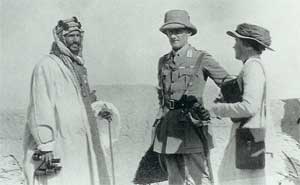

Political Evolution: From Military Rule to Self-Determination
Working with Arnold Wilson:After Cox left Mesopotamia in 1918, control fell to Arnold Wilson, the Acting British Civil Commissioner. Initially, Bell and Wilson got along well.
"Self-Determination in Mesopotamia" (February 1919):Bell wrote this memorandum showing no major differences with Wilson initially. The wartime provisional government drew on British India for inspiration, replicating its legal code and bureaucratic structure.
Paris Peace Conference (1919):Bell visited France and England, attending the Paris Peace Conference briefly in Wilson's stead. Plans for dismantling the Ottoman Empire took shape, with the Sykes-Picot Agreement (negotiated by the same Mark Sykes she had met 15 years earlier) allocating territories.
The Great Falling Out: Competing Visions
Bell's Evolving Views (1919):Over 1919, Bell became convinced that an independent Arab government in Mesopotamia backed by British advisors was the correct path. She was influenced by:
The provisional Hashemite government in Syria returning life to normal
The Egyptian Revolution of 1919 against the British
Her belief that the "spirit of 1919" would spread to Mesopotamia
Masterful Report: She spent nearly a year writing what was later considered a masterly official report: "Review of the Civil Administration of Mesopotamia".
Wilson's Opposition: Civil Commissioner Wilson disagreed, preferring Arab government under direct British control. He felt Mesopotamian populations weren't ready to govern efficiently and peacefully.
The 1920 Revolt: Shia tribes in central Iraq rose in revolt in summer 1920, making common cause with Sunnis. Wilson blamed Sharifan anti-British propaganda; Bell blamed Wilson's insufficiently deferential approach to local wishes.
The Cost: The revolt cost 50 million pounds, hundreds of British and Indian lives, and thousands of Arab lives to suppress.
Cox's Return (11 October 1920):Percy Cox returned to Baghdad, replacing the discredited Wilson. He asked Bell to continue as Oriental Secretary and liaison with the forthcoming Arab government, promptly restoring much Ottoman government structure and appointing more Iraqis to provincial leadership.
"Creating Iraq" (1921-1926)
The Cairo Conference: Reshaping the Middle East
March 1921: The Gathering of EmpireBritish officials in London, particularly new Secretary of State for War and Air Winston Churchill, wanted to reduce colonial expenses. The 1920 revolt had proven that direct governance was adding to costs—it was clear that Iraq would be cheaper as a self-governing state.
Churchill convened a conference in Cairo to resolve the future of British administration now that the war was finished. The Ottoman Empire was dead; new nations needed to be born from its ashes.
Gertrude's Vision: Gertrude was there, one of the few women in a room full of men deciding the fate of millions. She had a vision: an independent Iraq, led by someone who could unite its diverse peoples.
The Historic Exchange:
Churchill: "The question before us is simple: what shall we do with Mesopotamia?"
Gertrude: "With respect, Mr. Churchill, the question is what the people of Mesopotamia shall do with themselves. We must give them a leader they can respect, a government they can support."
The Orientalists' Influence
The Expert Circle: Bell, Cox, and Lawrence were among a select group of "Orientalists" convened by Churchill to determine internal boundaries of British mandates. Few British officials had experience in Arab or Kurdish affairs; Cox trusted Bell, making her unusually influential in these discussions.
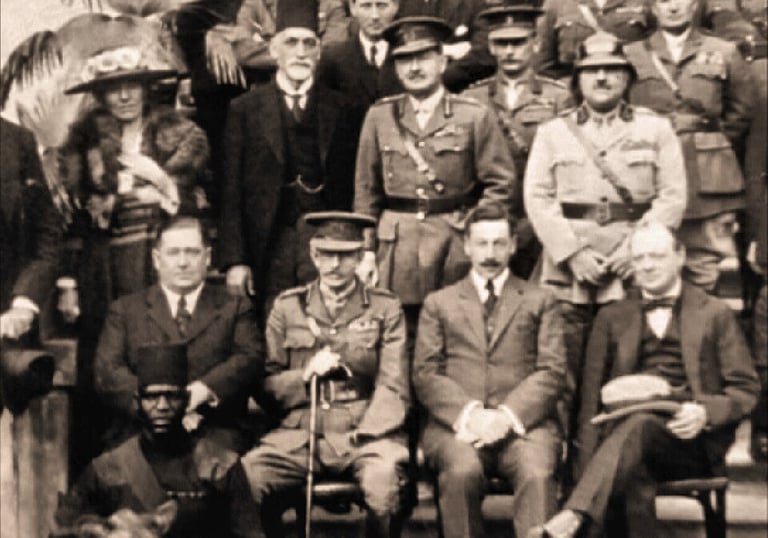

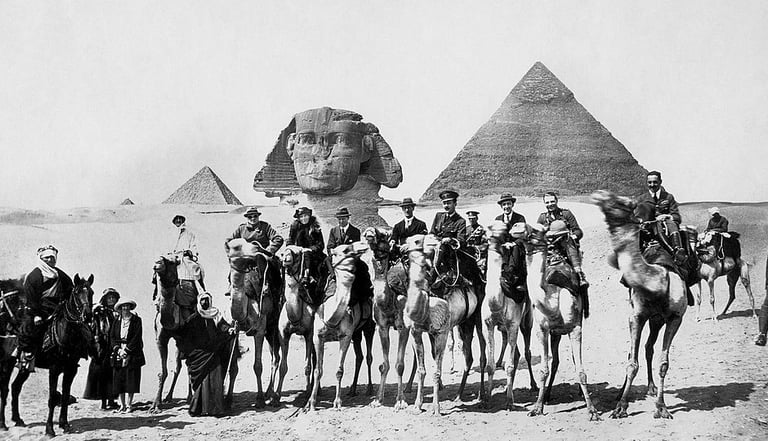

The French Complication: The British government had reluctantly allowed France to take Syria as part of Treaty of Sevres negotiations, creating the French Mandate for Syria and Lebanon. This complicated earlier British promises to Arab Revolt allies who had presumed they would lead a pan-Arab state centred in Damascus.
Schools of Thought: Cairo vs. India
The Debate: Various possibilities existed: continued direct mandate, independence on various terms, or even ceding northern territories back to the new Turkish state.
"Cairo School" (Bell, Cox, Lawrence): Favoured independence with British direction and alliance
"India School": Favoured direct rule by Britons
The Sharifian Solution:Throughout the conference, the Cairo School worked to promote establishment of independent Transjordan and Iraq, presided over by sons of Hussein bin Ali Sharif of Mecca—Abdullah and Faisal would serve as kings.
Bell's Strategic Reasoning
Faisal as Unifying Symbol: Bell thought Faisal's status as an outsider would enable him to hold together the new country as someone not beholden to any single group.
The Theory:
Shias would respect him because of his lineage from Muhammad
Sunnis would follow him because he was Sunni from a respected family
Pan-Arabism and Sharifism would provide legitimacy
Romantic Idealism: Bell was influenced by British thought that romantically considered desert Arabs of the Hejaz as "pure" Arabs, naturally suited to possessing legitimacy and respect.
The Mosul Question: Defining Borders
The Three Vilayets: The Ottomans had divided the region into:
Basra vilayet (south) - strategically important to Britain
Baghdad vilayet (central)
Mosul vilayet (north) - Kurdish-dominated and oil-rich
Bell's Vision: Bell advocated for expansive Iraqi borders including all three Ottoman territories, especially oil-rich Mosul.
Initial Defeat: At the conference, Churchill, Hubert Young, Lawrence, and others feared putting Kurds under Arab rule might make them sympathetic to Turkey. They insisted Southern Kurds only be included if they directly asked.
Ultimate Victory: Bell eventually got her way. During the 1921 referendum to endorse Faisal, referendum takers found enough pro-Faisal Kurdish elite members to satisfy the British government, allowing Mosul's inclusion in Iraq. Kurdish promises of autonomy were largely ignored.
Opposition to Zionism
Deep Mistrust: Against Arab-sympathetic Bell's wishes, the British decided to keep the Palestine Mandate under direct control rather than making it part of Transjordan.
Bell's Opposition: She opposed the Zionist movement, writing that she regarded the Balfour Declaration with "the deepest mistrust"and that "It's like a nightmare in which you foresee all the horrible things which are going to happen and can't stretch out your hand to prevent them".
Her Assessment:
"The country is unsuited to the ends the Jews have in view; a poor land, incapable of great development and with a solid two thirds of its population Mohammedan Arabs who look on Jews with contempt."
She described the Balfour Declaration as "an artificial scheme divorced from all relation to facts and I wish it the ill-success it deserves".
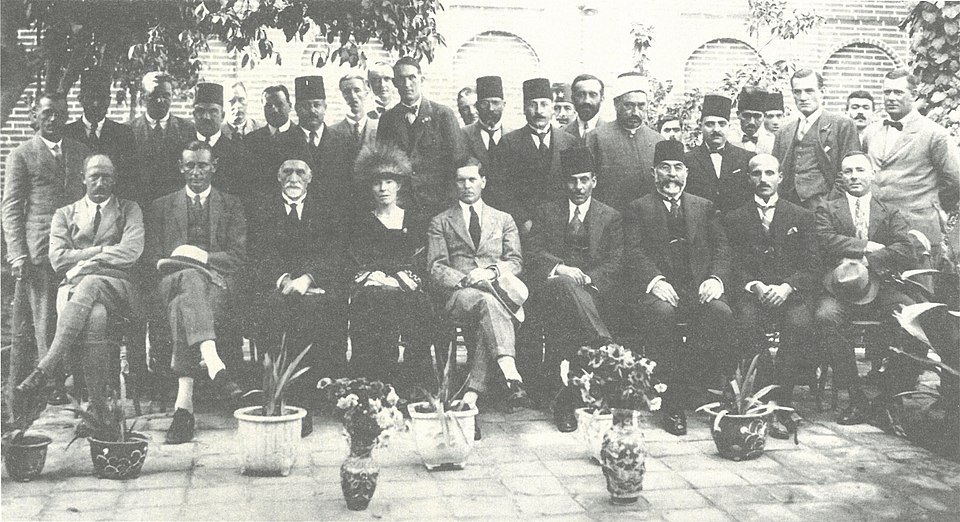

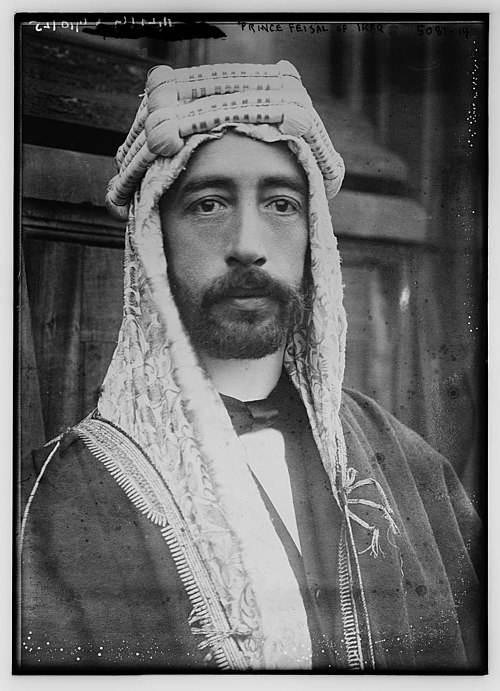

Creating a King: The Crown and the Woman
Eliminating Opposition: The Sharifian solution prevailed, and Faisal was presented to Iraq as the new king. The main local candidate, Sayyid Talib, was arrested and exiled in April 1921 after being invited to tea with Percy Cox's wife—at Bell's suggestion and with Cox's assent. Bell viewed Talib as a potential rebel if left unchecked.
Gertrude's Advocacy: Gertrude advocated passionately for Faisal ibn Hussein as King of Iraq—a Hashemite prince, leader of the Arab Revolt, someone not beholden to any single Iraqi faction.
"He's not from here, which means he belongs to everyone. Shias will respect his lineage from the Prophet. Sunnis will follow his leadership. He can be the symbol that unites them all."
The Coronation (23 August 1921):Faisal was crowned King of Iraq. Gertrude stood in the shadows, watching her vision become reality.
"I have helped create a nation today. The weight of that responsibility is almost unbearable. But watching Faisal take the crown, seeing the hope in people's faces—perhaps we have done something good."
Al-Khatun: The Lady of the Court
Trusted Advisor: Bell served in the Iraq British High Commission advisory group throughout the 1920s, integral to Iraq's administration in Faisal's first years. Upon Faisal's arrival in 1921, she advised him on local questions including tribal geography, leadership, and business.
The Iraqi Title: Referred to in Iraqi Arabic as "al-Khatun" (a Lady of the Court), Bell was Faisal's confidante and helped ease his passage into the role.
King Faisal's Dependence:
"Miss Bell understands my people better than I do myself. She knows every tribe, every leader, every ancient grievance and modern hope. Without her counsel, I would be lost in my own kingdom."
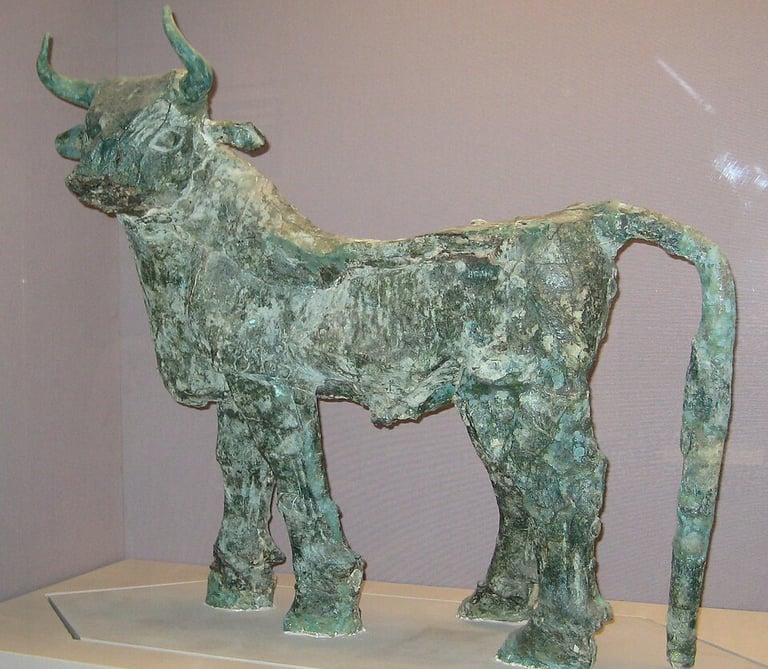

Nation-Building Tasks:
Mediator between Faisal's government, British officials, and local notables
Arranged receptions, parties, and meetings
Discussed affairs with British and Arab elite of Baghdad
Transferred requests and complaints to government
Designed the flag of Iraq and Faisal's personal flag
The Challenge of Unity: Balancing Diverse Groups
The Complex Demographics: The new Iraqi government had to mediate between various groups: Shias, Sunnis, Kurds, Jews, and Assyrian Christians. Keeping these groups content was essential for political balance and British imperial interests.
Creating National Identity: An important project was creating a new identity so these diverse peoples would identify as one nation.
The Shia Challenge: Establishing Faisal's legitimacy among the Shia population proved difficult. There was little enthusiasm when he landed at the Shia port of Basra.
Sunni Dominance: Faisal's administration, while reserving token positions for Shiites, was pan-Arabist and Sunni-dominated—a position Bell endorsed. Sunni elites made clear they would consider any reduction of their traditional Ottoman-era privileges a betrayal.
Bell's Concerns: Bell feared Shia leaders wouldn't respect modernism or secularism if given government power, potentially moving toward theocracy.
Personal Limitations: Bell had difficulty making close relationships with important Shia leaders, writing: "I was cut off from them because their tenets forbid them to look upon an unveiled woman and my tenets don't permit me to veil."
The Strain of Kingmaking
Personal Cost: Bell did not find working with the new king easy, writing in a 1921 letter:
"You may rely upon one thing — I'll never engage in creating kings again; it's too great a strain."
Preserving Iraq's Heritage (1922-1926)
Director of Antiquities: Protecting the Past
Royal Appointment (October 1922): King Faisal appointed Bell as Honorary Director of Antiquities, a task perfectly suited to her experience and love of archaeology.
Major Excavations: Several notable excavations took place during Bell's tenure:
Leonard Woolley's Ur excavations (1922-1934):Extensive work at the ancient city
Edward Chiera's Nuzi excavations: Bell personally invited this Assyriologist to conduct excavations near Kirkuk, where hundreds of inscribed clay tablets (now known as Nuzi tablets) were discovered and deciphered
Revolutionary 1924 Antiquities Legislation
The Problem: Archaeological dig approvals during Ottoman rule had been loose and unorganised—digs happened without registration, and no governing body had authority to oversee or enforce regulations.
Bell's Solution: As Director of Antiquities, Bell drew up proposed legislation to:
Clarify status of existing digs
Regulate granting of new permits
Adjudicate ownership of discovered artifacts
Create a Department of Antiquities to enforce the law
Political Opposition: Bell's initial proposals were considered overly friendly to British interests by Sati Al-Husri, Faisal's Director of Education and an Arab nationalist. Al-Husri slowed passage of the law.
The Compromise (1924): Bell's law passed after revisions, largely following the standard world model but notably reserving extensive power to the Director (herself) to judge whether antiquities would go to the national museum or be allowed for export.
The Innovation: Under Bell's law, 50% of artifacts were kept by Iraq, 50% by excavators—a hybrid bridging the gap between Ottoman chaos and later laws enforcing Iraqi sovereignty.
Baghdad Archaeological Museum: A Lasting Legacy
From Storage to Museum: As Director, Bell was responsible for storing excavated antiquities. Her initial storeroom, the "Babylonian Stone Room," soon filled up.
The Campaign (March 1923):She requested a dedicated museum building but was initially rejected. After sustained lobbying over the next years—carefully ensuring Iraqi government and society elites saw latest excavations from Ur and were invested in the project through parties and events—she finally secured a location.
The Achievement (March 1926):She secured the ground floor of a stationery and printing building for her museum plan. This became the Baghdad Archaeological Museum, later renamed the Iraq Museum. It opened in June 1926, shortly before Bell's death.
Professional Standards: Bell established procedures becoming standard worldwide:
Carefully kept ledgers of excavations and finds
Detailed descriptions of material, dimensions, and comments
Formal numbering system for tracking
Photographs of unusual finds sent to British Museum for analysis
Small but Dedicated Team: The Department of Antiquities consisted of only Abdulqadir Pachachi, Salim Lawi, and Bell from 1924-26.
Preserving Iraqi Heritage: Bell and the department helped preserve Iraqi culture and history, including important relics of Mesopotamian civilizations, keeping them in their country of origin rather than allowing wholesale export to Western museums.
Generous Bequest: Bell's will bequeathed:
£50,000 to the Iraq Museum (approximately £2.1 million in 2021 values)
£6,000 to the British Museum to establish the "British School of Archaeology in Iraq" in London (later renamed "The British Institute for the Study of Iraq"), continuing to fund excavation projects (approximately £250,000 in 2021 values)
National Library of Iraq: Building Intellectual Foundation
Supporting the Baghdad Peace Library:Muriel Forbes had advocated for a new library in Baghdad (1919-20) and founded the Baghdad Peace Library (Maktabat al-Salam). Bell energetically promoted the library and served on its Library Committee as president from 1921 to 1924.
Her Contributions:
Participated in fund-raising events
Solicited free copies of books from British publishers
Published articles in the library's Review
Evolution to Public Institution:The library started as a private, subscription library but due to financial difficulties was taken over by the Ministry of Education in 1924, becoming a public library. In 1926, it was one of only two public libraries in the country.
Legacy Names:
1929: Baghdad Public Library
1961: National Library of Iraq
FINAL YEARS: THE WEIGHT OF EMPIRE
Decline and Death (1923-1926)
Physical and Emotional Toll
Health Deterioration: The stress of her prodigious output took its toll:
Books, correspondence, intelligence reports, reference works, and white papers
Recurring bronchitis attacks from years of heavy cigarette smoking
Bouts with malaria
Coping with Baghdad's brutal summer heat
Physical Decline: Somewhat frail to start with, she became emaciated over the course of the 1920s and suffered a drastic collapse of her health in 1924.
Brief Return to Britain (1925): Bell returned to Britain facing continued ill health. She took the opportunity to correspond with Lawrence, who sought her advice on his forthcoming book "Seven Pillars of Wisdom."
Family Financial Troubles: The Bell family fortune began declining due to post-World War I coal strikes in Britain, culminating in the general strike of 1926 and economic depression in Europe. The Bells began preparation to move out of their expensive Rounton mansion to reduce costs.
Personal Losses: Upon returning to Baghdad, she developed pleurisy. While recovering, she heard that her younger half-brother Hugo had died of typhoid.
Professional Isolation
Departing Friends: Many of Bell's dear friends left Iraq in the early 1920s, most notably Percy Cox, who retired in 1923.
Reduced Influence:
Henry Dobbs, the new High Commissioner installed in 1923, kept Bell as Oriental Secretary but consulted her less frequently than Cox had
King Faisal no longer consulted Bell as much after his first year in office and had not lived up to her impossibly high expectations
While she threw herself into her Director of Antiquities position with gusto, she disliked being sidelined from high affairs of state
Failed Romance: In late 1922, she struck up a lasting friendship with Kinahan Cornwallis, a fellow British advisor in Iraq. She signaled openness to romantic involvement with the much younger Cornwallis but was rejected. Their relationship remained a professional friendship.
Psychological Struggles
Depression (1923-1926): Bell suffered psychologically and may have been depressed during these years.
The Final Blow: Over two days in 1925, both her beloved pet dog and Kinahan Cornwallis's dog (whom she had looked after and cared for) died.
Death: Mystery and Mourning
The Final Night (12 July 1926): Bell was discovered dead of an overdose of allobarbital sleeping pills. Whether the overdose was intentional suicide or accidental overdose remains unknown.
Contradictory Evidence:
Suggesting accident: She had asked her maid to wake her in the morning
Suggesting intention: She had requested Cornwallis to look after her new dog "in case anything happened to her" the previous day, and had recently written a philosophical letter to her mother about how her lonely existence "cannot extend forever"
The Funeral: She was buried at the Anglican cemetery in Baghdad's Bab al-Sharji District the same day. Her funeral was a major event, attended by a large crowd. King Faisal reportedly watched the procession from his private balcony as they carried her coffin to the cemetery.
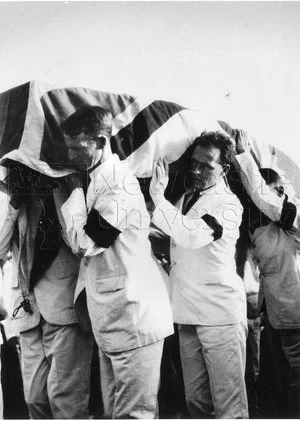

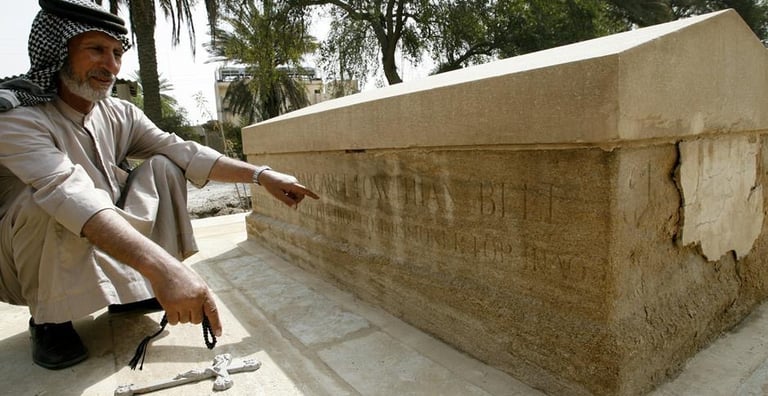

Gertrude Bell's funeral, Baghdad, 12th July 1926. Photo: Gertrude Bell Archive, Newcastle University
Iraqi groundskeeper Ali Mansur at the old Christian cemetery in Baghdad points to the tomb of Gertrude Bell.
VIEWS AND POSITIONS: A COMPLEX LEGACY
Contradictory Beliefs
Old-Fashioned Aristocratic Views: Bell's upper-class background and historical training led her to hold views considered old-fashioned for the time, seeming to pine for an older, nobler aristocratic age.
Historical Understanding: Her historical training aided understanding of the Middle East when many Britons were essentially ignorant of the region's history after early Christianity and the late Roman Empire. However, she phrased appeals to Arab nationalists in terms of recreating a lost Golden Age of early Caliphates rather than using modern arguments.
Dual Nationalism: She was simultaneously an Iraqi nationalist and British imperialist, seeing no contradiction, though fissures between Iraqi state interests and British Empire interests developed almost immediately.
Personal Characteristics
Independent Spirit: From early age, Bell was outspoken and independent despite being raised in a deferential society, willing to verbally contest respected professors and experts during schooling.
Intellectual Arrogance: This sometimes manifested as arrogance, especially toward British people she perceived as non-experts. However, she would back down when sparring with fellow Arabists.
Contrarian Nature: She occasionally had a contrarian bent, seemingly enjoying supporting tough causes.
Religious Views: Bell had a rationalist perspective and espoused atheist views. She unsuccessfully attempted to convince her half-brother Hugo not to enter the Church as a clergyman.
Women's Suffrage: A Surprising Position
Anti-Suffragist Stance: Bell took an anti-suffragist position when momentum was building toward women's suffrage among highly educated women like herself. She was a founding member of the Women's National Anti-Suffrage League in 1908 and president of its northern branch.
Reasoning: Her stance may have arisen from both parents being anti-suffragists and her belief that women could already be successful under the existing system without the vote.
Evolution of Views: She appears to have softened on this stance later in life. After Parliament granted suffrage to women in 1918, Vita Sackville-West wrote that after visiting her in 1925, Bell had welcomed the move for women's rights and shifted from her father's Liberal views to considering being a Labour voter.
Political Inconsistencies
Changing Positions: Bell's voluminous letters document her changing and sometimes contradictory beliefs on Arab state plausibility, British involvement degree, and challenges involved.
Lawrence's Assessment: T.E. Lawrence once remarked that she "changed her direction every time like a weathercock" (though in the same statement, he wrote she was a "wonderful person").
Impossible Expectations: At different times, she wrote both for and against an independent Arab state, direct British rule, and the Sharifian solution. Later, she wished for Faisal to be both an independent ruler with legitimacy to Iraqis and great personal authority, yet also a ruler who simultaneously agreed with British requests and priorities—an impossible position.
Prescient Warnings: Despite inconsistencies, she grasped the dangers of British involvement better than many contemporaries. Her 1920 report showed striking ambivalence on the imperial project's wisdom and capacity.
Understanding Tribal Culture
From the Arab Bulletin (October 1917):
"Men who have the tradition of a personal independence which was limited only by their own customs, entirely ignorant of a world which lay outside their swamps and pasturages, and as entirely indifferent to its interests as to the opportunities it offers, will not in a day fall into step with European ambitions, nor welcome European methods. Nor can they be hastened. (...) In our own [English] history, from the Moot court through Magna Charter to the Imperial Parliament was the work of centuries, yet the first contained the grain of all that would come after."
GERTRUDE'S LEGACY: THE LASTING IMPACT
Modern Iraq's Boundaries
Enduring Borders: The boundary lines of Iraq that emerged during the Ottoman Empire partition, the 1921 Cairo Conference, and 1922 addition of Southern Kurdistan still hold today for the modern state of Iraq.
The Kurdish Question: The inclusion of Kurdish-dominated Mosul vilayet in Iraq is still considered a mistake by many historians and commentators. Bell supported this inclusion of traditionally Kurdish lands in an Arab-dominated state, against advice from contemporaries including T.E. Lawrence, Edward Noel, and E.B. Soane.
Limited Kurdish Contact: Bell had extensive contact and personal friendships with many Arabs but comparatively limited contact with Kurds, perhaps leading to unfounded optimism about including Kurdish lands in Iraq. As part of her Iraqi government role, she supported suppression of Kurdish revolts in the 1920s and didn't particularly advocate for privileges or autonomy for the region.
Kurdish Division: The division of Kurds between Iraq, Syria, Turkey, and Iran led to their oppression in all four countries. Saad Eskander wrote that Bell is more fondly remembered by Iraqi Arabs than Iraqi Kurds as a result.
Government Structure
Decentralisation Vision: Bell proposed many aspects of government be decentralised, both because it was the only feasible way to maintain a heterogeneous multi-ethnic and multi-religion state, and due to romanticisation of classical Arab culture.
Tribal Criminal and Civil Disputes Regulation: Under her regulation, local sheikhs in countryside had wide authority to manage tax collection and judiciary; national government only had such authority in major cities.
Later Repeal: Later rulers favoured strong, centralised government and found this decentralisation intrusive. Bell's law was repealed by the new Iraqi republic government after the monarchy's overthrow in 1958.
Archaeological Contributions
Priceless Documentation: Bell's work in archaeology and tenure as Director of Antiquities is generally well-regarded. Her photographs, notes, and detailed plans of sites visited from 1909-1914 are "priceless documentation" preserving knowledge of many monuments and buildings since damaged or destroyed.
Memorial Recognition: A memorial plaque dedicated to Bell was installed at the Archaeological Museum in 1930 after King Faisal requested her memory be honored in the project to which she had devoted so much effort.
Successor Problems: However, non-Iraqi archaeologists' reputation later suffered due to her corrupt successor, Richard Cooke, who was forced to resign after being caught using his position to smuggle antiquities for personal profit.
Revised Legislation: After several short-lived successors, Sati' al-Husri (Bell's political rival) took over as Director of Antiquities in 1934, successfully advocating for new 1936 legislation giving the Iraqi government additional power in antiquities division.
Library Legacy
Intellectual Foundation: Bell's work with the future National Library of Iraq and National Museum library was praised as helping establish the basis for libraries that would become among the best in the Middle East by the 1980s.
Scholarly Tradition: Ian Johnson praised it as a step toward bringing back a tradition of scholarship from the Abbasid Caliphate; the region had become an intellectual backwater under Ottoman rule.
POSTHUMOUS COMMENTARY: HOW HISTORY REMEMBERS
Contemporary Tributes
Immediate Recognition: Many of Bell's compatriots wrote admiring articles, reports, and lectures upon receiving news of her death, including Vita Sackville-West, Leo Amery, Arnold Wilson, Percy Cox, Henry Dobbs, and others.
D.G. Hogarth's Obituary: An obituary by her peer expressed the respect British officials held for her:
"No woman in recent time has combined her qualities – her taste for arduous and dangerous adventure with her scientific interest and knowledge, her competence in archaeology and art, her distinguished literary gift, her sympathy for all sorts and condition of men, her political insight and appreciation of human values, her masculine vigour, hard common sense and practical efficiency – all tempered by feminine charm and a most romantic spirit."
Professional Assessment
H.V.F. Winstone's Evaluation: Bell's 1920 white paper, "Review of the Civil Administration of Mesopotamia,"Possibly the first white paper composed by a woman, is considered important and influential. Winstone called it her "finest political work."
Lasting vs. Temporary Legacy: Winstone also wrote that despite the later fall of the Kingdom of Iraq, Bell's "real work" had been her earlier role as archaeologist, scholar, author, translator, and adventurer—a legacy that would last long after the Iraqi monarchy was forgotten.
Critical Voices
Elie Kedourie's Critique: An Iraqi Jew who left the country to become a conservative British historian, Kedourie denounced:
Faisal as a "pathetic incompetent"
Lawrence as a "fanatic"
Bell for her "sentimental enthusiasm" and "fond foolishness" in advocating an Arab state
Kedourie's Alternative: He blamed them for unleashing Arab nationalism in a region where it had been previously unknown. Kedourie admired large multi-ethnic empires and favored Arnold Wilson's solution of direct British rule, believing it would better protect minority rights. The Iraqi Jewish Community would greatly shrink in the 1940s and 50s facing oppression from the hostile government.
Balanced Historical Assessment
Karl E. Meyer and Shareen Blair Brysac:They described Bell as "one of the few representatives of His Majesty's Government remembered by the Arabs with anything resembling affection"in an overview of British policy-making following World War I.
Physical Memorials
King Faisal's Memorial (January 1930):King Faisal dedicated a section of the Baghdad Archaeological Museum as a memorial to Bell.
Stained Glass Window: A stained-glass window dedicated to her memory, made by Douglas Strachan, was erected in St Lawrence's Church, East Rounton, North Yorkshire. It depicts Magdalen College, Oxford, and Khadimain, Baghdad.
The Inscription: The window commemorates her as "Versed in the learning of the east and of the west, Servant of the State, Scholar, Poet, Historian, Antiquary, Gardener, Mountaineer, Explorer, Lover of Nature of Flowers and of Animals, Incomparable Friend Sister Daughter".
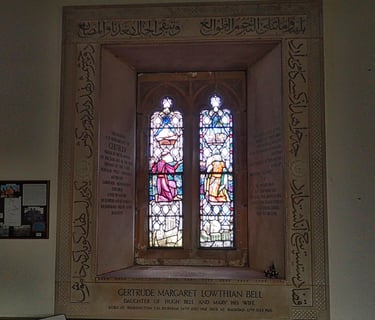

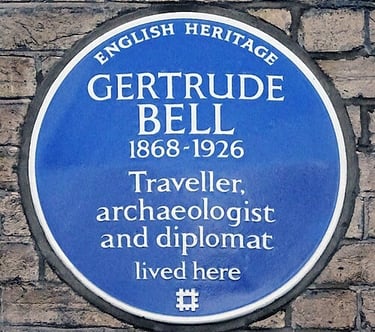

Scholarly Precision: Understanding Through Connection
Gertrude didn't just visit ancient sites—she understood them with scholarly precision. Fluent in Arabic, Persian, Turkish, French, German, and Italian, she could speak to local people in their own tongues and read ancient inscriptions that baffled other Western visitors.
"Each stone tells a story. Each fragment of pottery connects us to lives lived centuries ago. I am not just uncovering artifacts—I am uncovering human dreams, fears, and hopes."
"Today we uncovered a Byzantine church floor, its mosaics still brilliant after a thousand years. The local workers gathered around in wonder. 'This is our history too,' said Mahmud, my foreman. 'These stones remember our ancestors.' In that moment, I understood that archaeology is not about possession—it's about connection."
A Meeting with Lawrence: Kindred Spirits
At Carchemish in 1909, she met a young archaeologist named T.E. Lawrence. Both Oxford graduates, both Arabic speakers, both destined to shape the Arab world's future in ways they couldn't yet imagine.
T.E. Lawrence's Assessment:
"Gertrude Bell was unlike anyone I had ever met. She understood the Middle East not as a collection of exotic curiosities, but as a living civilisation with its own logic, its own beauty, its own right to self-determination. We recognised kindred spirits immediately."
21st Century Recognition
Newcastle University Comic (2010s): A team from Newcastle University released a comic version of Bell's life, with John Miers as cartoonist.
Red Barns Memorial Campaign (2016): A campaign was launched to transform the Bell family's former estate, Red Barns, into a memorial and museum. The family were patrons of the Arts and Crafts movement, and the home in Redcar features wallpaper by William Morris. Though Grade II listed, it had not been maintained.
Museum Exhibitions:
2015: Exhibition at Great North Museum in Newcastle helped raise interest
Later moved to Kirkleatham Museum in Redcar
UNESCO Recognition (2017): The Gertrude Bell archive, an extensive record of Bell's writings held by Newcastle University, was added to the UNESCO Memory of the World programme.
Scientific Honour (2019):Entomologists studying wild bees in Saudi Arabia described a new genus named to honor Bell: genus Belliturgula, known from the species Belliturgula najdica from central Saudi Arabia.
Historical Connections
Lawrence of Arabia Meeting Place: Bell first met Lawrence of Arabia at the ruins of the ancient city of Carchemish, which today would be in Turkey near the border with Syria—a fitting location for two people who would help reshape the region's future.
CONCLUSION: THE WOMAN WHO MADE KINGS
Gertrude Bell's extraordinary life spanned the transformation of the modern world. Born into Victorian privilege, she refused to be constrained by the limitations placed on women of her era. Instead, she forged her own path as scholar, explorer, archaeologist, intelligence officer, and ultimately as one of the most influential figures in shaping the modern Middle East.
Her legacy is complex and sometimes contradictory—like the woman herself. She was simultaneously a champion of Arab independence and a servant of British imperial interests, a woman who fought against women's suffrage yet broke every barrier placed before her own gender, a scholar who preserved ancient civilizations while helping to create new nations.
The Enduring Questions:
Bell's life raises profound questions that resonate today:
Can cultural understanding bridge political divides?
What is the cost of expertise without representation?
How do we balance preservation of the past with the needs of the present?
What happens when individual brilliance intersects with historical forces beyond any one person's control?
The Lasting Impact:
The Iraq that Bell helped create faced decades of turmoil, revolution, war, and reconstruction. The borders she advocated for remain, but the unity she envisioned proved elusive. The Kurdish question she dismissed continues to shape regional politics. The archaeological treasures she fought to preserve faced looting, destruction, and neglect in later conflicts.
Yet her contributions endure:
The Iraq Museum she founded remains a guardian of Mesopotamian heritage
The National Library of Iraq continues her vision of intellectual development
Her archaeological documentation preserved knowledge of sites now lost forever
Her writings provide invaluable insights into a pivotal moment in history
The Human Story:
Beyond the politics and archaeology, Gertrude Bell's story is profoundly human. It's the story of a brilliant woman who never found lasting love, who created nations but never had children of her own, who understood ancient civilisations but struggled with the loneliness of her own existence.
Her death at 57—whether by accident or design—came just as the Iraq Museum she had fought to establish opened its doors. She died as she had lived: at the intersection of triumph and tragedy, achievement and isolation, hope and despair.
The Daughter of the Desert:
The Bedouin tribesman who called her "bint aarab"—daughter of the Arabs—recognised something that transcended nationality and gender. Bell had become something rare in any age: a bridge between worlds, a translator not just of languages but of cultures, dreams, and possibilities.
She was, in the truest sense, a daughter of the desert—shaped by its vastness, tested by its dangers, and ultimately claimed by its eternal mysteries. The desert that taught her patience, courage, and truth became her final resting place, in the cemetery of Baghdad where she lies still, watched over by the city she helped to transform.
Her Own Words:
Perhaps Bell herself said it best in one of her final letters:
"I have had the great good fortune to see the birth of a nation. Whether it will grow to greatness or fall to ruin, I cannot say. But I have been present at the making of history, and that is more than most people can claim."
QR Information Services: Bringing History to Life
This introduction to Gertrude Bell's extraordinary life represents just the beginning of what's possible when cutting-edge QR technology meets compelling historical storytelling. Through our innovative QR Information Services, we transform static information into immersive, interactive experiences that bring the past to life.
What We Offer:
🗺️ Heritage Trails & Historical Tours
Interactive QR codes at historical sites
Multilingual audio guides and visual content
Educational resources for schools and tourists
Custom content creation for councils and heritage organisations
📚 Digital Archives & Museums
QR-enabled exhibits and displays
Virtual tours and augmented reality experiences
Preservation of local history and cultural heritage
Interactive learning experiences for all ages
🏛️ Educational & Cultural Projects
Town trails and walking tours
Historical documentation projects
Community heritage initiatives
Archaeological site interpretation
The Gertrude Bell Experience:
Our Gertrude Bell Memorial project demonstrates the power of QR technology to create meaningful connections with history. Through strategically placed QR codes, visitors can:
Access rare photographs and documents
Listen to dramatic readings of Bell's own words
Explore interactive maps of her journeys
Discover connections between past and present
Experience immersive storytelling that brings history to life
Why Choose QR Information Services?
✅ Innovative Technology:Cutting-edge QR solutions that work seamlessly across all devices
✅ Expert Content Creation:Professional historical research and compelling storytelling
✅ Custom Solutions: Tailored projects for your specific needs and audience
✅ Proven Results: Successfully implemented heritage trails and cultural projects
✅ Local Expertise: Deep understanding of British history and heritage
✅ Educational Focus: Content designed to engage learners of all ages
✅ Sustainable Approach: Digital solutions that reduce environmental impact while increasing accessibility
Our Vision:
We believe that history should be accessible, engaging, and relevant to modern audiences. Through QR Information Services, we're creating a new model for heritage interpretation that combines the convenience of modern technology with the power of great storytelling.
Every QR code is a doorway to discovery. Every scan is an opportunity to connect with the past and understand our present. Every project we undertake helps preserve and share the stories that define who we are.
Get Started:
Ready to bring your historical project to life? Whether you're a local council planning a heritage trail, a museum seeking to enhance visitor experience, or an educational institution looking to engage students with interactive content, QR Information Services has the expertise and technology to make it happen.
Contact QR Information Services today and discover how we can help you create unforgettable historical experiences that educate, inspire, and endure.
QR Information Services
A Division of QR Living Memories Ltd
🌐 Website:www.qrlivingmemories.com
📧 Email:info@qrlivingmemories.com
📞 Phone: 0800 433 2413
© 2025 QR Living Memories Ltd. All rights reserved.
The introduction to the life of Gertrude Bell was produced by QR Information Services. Historical content compiled from research including the Gertrude Bell Archive at Newcastle University.
Gertrude Bell Memorial Window
A plaque on a house in Sloane St. in Chelsea where Bell lived for a time
The Copper Bull, excavated in 1923 at Tell al-‘Ubaid, near the ancient city of Ur.
King Faisal; photo from c.1915-1920
Photograph taken near the Pyramids; Bell is between Churchill and T.E Lawrence beneath the Sphinx.
British and Iraqi dignitaries in Baghdad 1923 during Mandatory Iraq. Left to right front row, Kinahan Cornwallis, Sassoon Eskell, and Gertrude Bell. Bernard Henry Bourdillan stands behind Bell in the 2nd row.
Bell, Percy Cox and Ibn Saud during the meeting at Basra, 1916
Seated, from right: Winston Churchill, Herbert Samuel. Standing first row, from left: Gertrude Bell, Sassoon Eskell, Edmund Allenby, Jafar Pasha Al-Askari.
St. John Philby
Winston Churchill, Gertrude Bell & T.E Lawrence. Misir 1921
Gertrude Bell in 1909, visiting archaeological excavations in Babylon.
Bells workers at the Binbirkilise excavations in 1907.
1907 photograph of Bell and Fattuh, an Arab who accompanied her on many of her trips.


